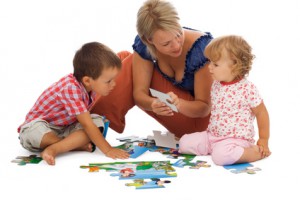Nurture Your Child’s Attention Span
I love to watch parents interact with their children. Over time, I have observed at least three ways parent tend to interact with their children.
 The parent points out a toy or some object in an effort to direct their child to play with that particular object. If you watch closely, you’ll see their child’s eyes wander and the child ultimately gravitate toward toys he likes in spite of his parents’ desires and effort to “direct” their child’s focus.
The parent points out a toy or some object in an effort to direct their child to play with that particular object. If you watch closely, you’ll see their child’s eyes wander and the child ultimately gravitate toward toys he likes in spite of his parents’ desires and effort to “direct” their child’s focus.- The child picks a toy he likes and, before beginning to play with it, brings it to show his parents. His parents briefly acknowledge the toy before quickly turning their attention to another toy, a text, or something else in the area. They give very little attention to their child’s activity. The child continues to play, but moves from toy to toy rather quickly.
- The child picks out a toy he likes and, before beginning to play with it, brings it to show his parents. His parents not only acknowledge the toy, they join in the play. This parent attends to the child’s manner of play and even follows the child’s lead in play. The parent and child enjoy their playful interaction.
Research by Yu and Smith (read more in Infant Attention Span Suffers When Parents’ Eyes Wander During Playtime) suggests that each of these patterns of interaction will influence your child’s attention span! Parents who constantly direct their children’s play or parents who let their own attention wander during play time (as in scenario #1 and #2) raise children with shorter attention spans. Children who played with toys while their parents actually attended to them, them play, and their play object (Scenario #3) exhibited four times the attentional skills. In fact, the longer a parent attended to some toy with their child, the longer the child continued to attend to that toy, even after the parent stopped!
Based on the findings of this research, you can influence your children’s attention span by becoming a responsive student of them. Pay attention to what interests your children. When you see some object or activity “catch your children’s eye,” attend to that object or activity with them. Follow their lead. Join them in their interests and their world. Be curious with them. Engage in the play they initiate. When you tune in to your children’s interests and coordinate your attention with theirs, you actually train their ability to focus and pay attention—you encourage the development of their attention span!
-0 Comment-